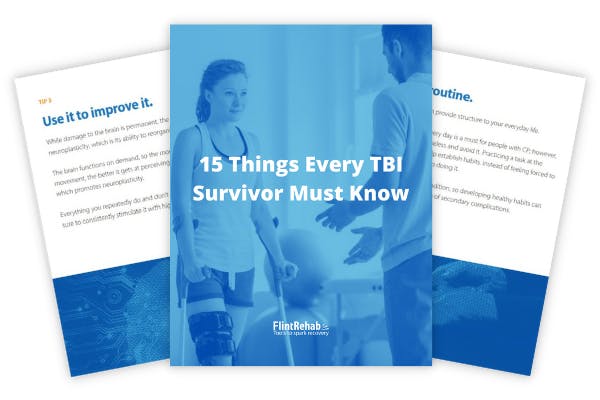No products in the cart.
No products in the cart.
No products in the cart.
No products in the cart.
Home » Neurological Recovery Blog » Traumatic Brain Injury » TBI Side Effects » Flat Affect After Brain Injury: How to Overcome Lack of Emotional Expressiveness
Last updated on April 21, 2020

A seeming lack of emotion is a common symptom of brain injury. However, most people with this problem do not actually lack emotions. Rather, they have limited ability to show signs of emotion with their facial expressions or voice, and typically demonstrate less reaction to emotional stimuli.
This condition, also known as flat affect, is caused by damage to the frontal lobe of the brain. Depression and other emotional problems can also contribute.
You’re about to learn the causes and symptoms of flat affect and how to treat it. Let’s get started.
The area of the brain most involved in emotion is called the limbic system. This system includes three important structures within the brain:
These structures help the brain control emotional responses. They are what allow us to react appropriately to emotional situations. Thus, if a brain injury damages these structures, the person may lose control of their emotions.
Another part of the brain that plays a role in emotion is the cingulate cortex, which connects to the limbic system. The cingulate cortex helps translate emotions into facial expressions.
Therefore, if this cortex becomes damaged, a person will have trouble expressing emotions with their face and voice. Psychologists call this lack of emotional expressiveness after brain injury “flat affect” because the person’s voice often has a flat, monotonous sound.
Not every TBI survivor who shows a lack of emotion has flat affect. Other conditions that can cause similar symptoms after brain injury include:
In addition, some medications can also impact the way a person feels and shows emotion.

Persons who experience flat affect after brain injury often show certain symptoms, such as:
It’s important to realize that patients with flat affect can still experience emotions, they have simply lost the ability to express themselves.
People with brain injury can also develop a condition known as blunted affect or “emotional blunting.” Symptoms of blunted affect are similar to flat affect, but instead of showing no emotions, the person’s expressions are simply restrained.
Blunted affect is most common in patients with PTSD.
These symptoms can make the person appear as though they do not care about anything or other people. But for most brain injury patients, this is not true. They do care, they just are having difficulty showing it.
The best way to treat flat affect after brain injury is to address the root causes.
For example, it is possible that your depression or PTSD is causing you emotional problems. Addressing them with a therapist and medication may help lift your flat affect.
Sometimes, flat affect can occur jointly with other cognitive effects that make it difficult for patients to understand which emotions they feel. In those cases, cognitive-behavioral therapy can be useful.

CBT therapists can teach patients how to identify their emotions and react appropriately. They do this through a series of exercises that help a person better understand their behavior and the emotions that might have caused it.
Cognitive-behavioral therapy can also retrain people to use facial expressions when interacting with others. For example, a therapist might help you learn to smile and make eye contact when you say hello to someone.
The more you practice these behaviors, the more you will rewire your brain until these actions feel natural again.
Another therapy that can help you overcome flat affect is speech therapy. Specifically, speech therapy can help you eliminate a monotone voice.
A monotone voice usually occurs after a right hemisphere injury. The brain’s right hemisphere controls a person’s awareness and appreciation of music. This awareness also plays a part in the way we speak.
When a person suffers damage to the right side of their brain, not only can their ability to appreciate music be diminished, but they may also have trouble picking up on the subtle changes in pitch or tone during speech.
This diminished musical ability can cause the person to sound monotone when speaking, giving them an almost robotic voice.
Speech therapists can help you regain the ability to control the pitch and tone of your voice. They do this through a therapy called melodic intonation therapy (a.k.a. music therapy).
Once again, the more you practice music therapy, the better you will get at controlling your voice. That’s the power of neuroplasticity!

When a loved one has flat affect, it can often feel like they have become cold and withdrawn, which can put a strain on relationships.
It might help to remember that your loved one most likely is just as frustrated by their lack of emotions as you. But while they can’t translate their feelings into physical or verbal expressions, that doesn’t mean they don’t care.
Still, it’s important to take care of your own mental health too. You might want to consider talking to a therapist familiar with brain injury. They can offer more personalized advice for coping with flat affect.
Flat affect can be a challenging symptom of brain injury to deal with. But fortunately, there is hope for recovery.
Whether your lack of emotions is caused by depression or brain damage, cognitive and speech therapy can help. By practicing emotional expression with a therapist, you can rewire the brain to express emotion again.
Even if you don’t feel emotions right away, learning how to better communicate non-verbally can help improve important relationships in your life.

If you like our content, you’ll love our ebook and newsletters! Get instant access to our TBI recovery tips ebook with 20 pages of helpful advice by signing up below.
You’ll also receive our emails that share survivor stories and more useful TBI recovery tips, which you can opt out of at any time. (We know you’ll love them, too.)
We will never sell your email address, and we never spam. That we promise.


Time with a speech therapist is extremely valuable during recovery, especially if you struggle with communication, critical thinking, or memory after brain injury. Insurance typically covers speech therapy for a fixed amount of time. But once it’s over, recovery is in your hands.
That’s why a team of neuroscientists and clinicians from Boston University created the CT Speech & Cognitive Therapy app. Designed for those recovering from stroke, TBI, or living with neurological conditions, the app contains over 100,000 cognitive exercises that are all available right from your phone or tablet. That’s like having a speech therapist by your side whenever you want!
This app is the perfect fit if you want to improve your speaking, memory, or general mental sharpness. And, it’s affordable at just $29.99/month!
“For the past 6 months, my son has used the app about three times a week. The app is like a virtual therapist, it’s very easy to use, and it gives him immediate feedback.
He now understands things faster, can make decisions with less hesitation, has improved recognition of words, and his confidence is higher. I also find it easy to get in touch with customer service; they pleasantly help out. The whole experience has been great.”
— Miriam
With the CT App, you can get the guidance you need right from your phone or tablet. You can use it on your own or in between sessions with your speech therapist.
Whether you struggle with aphasia, memory loss, or critical thinking, the CT Speech & Cognitive Therapy App can help.
“The CT app has helped me gather my confidence by building on and reinforcing old forgotten skills. It helps to see my percentages increase, and work harder when they decrease. It’s very self-motivating.” -Kathryn
We are confident that this app will help improve your speech and cognitive function after brain injury. Like our recovery tools, the CT App is also covered by our 30-day money-back guarantee.

Do you know these 15 TBI recovery tips?
Get a free copy of our ebook 15 Things Every TBI Survivor Must Know. Click here to get instant access.
Grab a free rehab exercise ebook!
Sign up to receive a free PDF ebook with recovery exercises for stroke, traumatic brain injury, or spinal cord injury below: